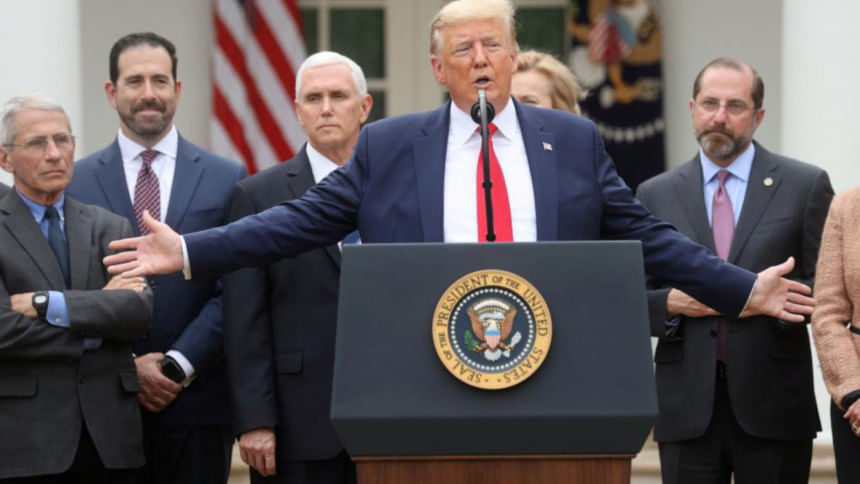Fatal Flaws: Coronavirus Exposes US

"You only find out who is swimming naked when the tide goes out." — Warren Buffett, US investor and business magnate
Coronavirus is beginning to scare the living daylights out of ordinary Americans.
The threat is two-fold. There's the actual threat from the virus itself, and then there's the godawful government screw-up in dealing with it. Like a fish that rots from the head, many critics point to US President Donald Trump.
At times like these, it is traditional for the US president to speak to the nation to provide reassurance. Trump addressed the nation from the Oval Office at the White House on March 11. His efforts left a lot to be desired, to put it mildly.
Former New York Times columnist Frank Rich lashed out in New York magazine: "The most urgent question is not whether the coronavirus is the crisis that will doom the Trump administration. It is whether the Trump administration is the crisis that will doom America."
Rich added, incredulously: "Has anyone ever heard of a televised presidential speech that had to be corrected within minutes after it ended by both the president who delivered it and officials in his own government?"
Trump and his aides hastily backtracked as they scrambled to clean up after his mess. No, Trump's travel ban did not mean cutting off trade with Europe. No, his ban did not include US citizens and permanent residents, either. As for his promises of health insurance companies waiving charges for coronavirus treatment? Here Trump (and his speechwriters) were being economical with the truth. It's not the treatment, just the testing, silly!
The speech spooked the markets. The Dow Jones stock market index went down 10 percent, its sharpest drop since its 1987 crash.
In a bit of gallows humour, Wall Street strategist Luca Paolini was quoted by the Financial Times as saying, "This was the most expensive speech in history."
Right from the get go, the Trump administration treated the pandemic as a public relations challenge rather than a public health crisis. The administration's stand—now exposed as disastrously fanciful—was that it was just a few cases, and soon it would be gone. All February, the administration sat on the information while crucial weeks went by.
From a public health standpoint, the country lost crucial time to track the spread of the virus. The biggest challenge in the US now is that we have no idea how badly the population is affected or where the hotspots are. Epidemiologists are essentially flying blind.
It's an outrage how few people have been tested. According to the Atlanta-based Centers for Disease Control and Prevention, so far only 15,000 people have been tested in the US, a nation of 350 million people.
South Korea has the capacity to test as many people per day. Testing is free, takes less than 10 minutes, and results are texted by the next day. "A nation of 51 million, South Korea has tested about 250,000 people since its outbreak began on Jan. 20… It has conducted 3,600 tests per million people compared to five per million in the US," the National Public Radio reports.
On top of the incompetence, there are broader socio-economic public health challenges to which there are no satisfactory answers. A huge part of the US population are hourly workers, who live paycheque-to-paycheque. Will they agree to quarantine themselves without pay in the event of symptoms when that could mean going out without food or missing the rent payment? How to identify, monitor and treat the tens of millions of people without medical insurance who cannot afford to see a doctor?
Instead of dealing with these critical challenges head-on, the administration and its right-wing supporters continue going down the rabbit hole with bizarre conspiracy theories, including one that considered it a Democratic "deep state" plot to undermine Trump before facts overtook them. There is an absurd xenophobic edge in Trump's reference to a "foreign virus". What other kinds will they come up with? "Undocumented virus"? "H1B virus"? The mind boggles.
There's nothing like a real crisis to expose the shortcomings in an administration and a policy. But will the right lessons be drawn?
Peter Wehner, a Republican who was a writer in the administrations of US presidents Ronald Reagan, George H.W. Bush and George W. Bush, is confident that it will.
"The coronavirus is quite likely to be the Trump presidency's inflection point, when everything changed, when the bluster and ignorance and shallowness of America's 45th president became undeniable, an empirical reality, as indisputable as the laws of science or a mathematical equation," Wehner writes in The Atlantic magazine.
"It has taken a good deal longer than it should have, but Americans have now seen the con man behind the curtain. The president, enraged for having been unmasked, will become more desperate, more embittered, more unhinged. He knows nothing will be the same. His administration may stagger on, but it will be only a hollow shell. The Trump presidency is over."
I'm a bit more sceptical, I'm afraid. My caution springs from H.L. Mencken's 1926 observation in the Chicago Daily Tribune: "No one in this world, so far as I know… has ever lost money by underestimating the intelligence of the great masses of the plain people. Nor has anyone ever lost public office thereby."
Ashfaque Swapan is a contributing editor for
Siliconeer, a digital daily for South Asians in the United States.

 For all latest news, follow The Daily Star's Google News channel.
For all latest news, follow The Daily Star's Google News channel. 



Comments